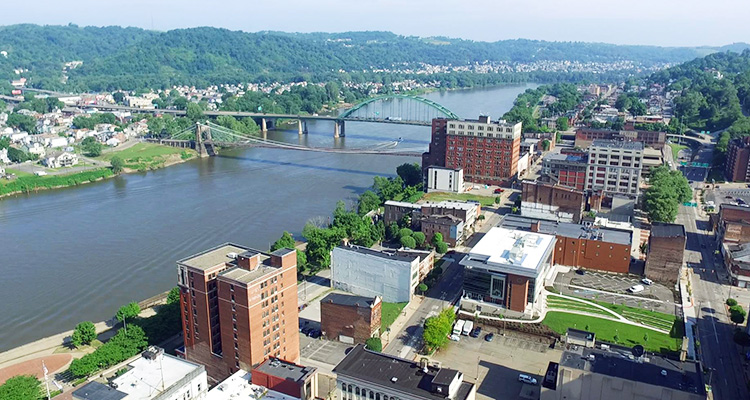Editor’s note: Yesterday, it was announced that Wheeling Heritage had won the 2019 Great American Main Street Award. Today, we hear more about the organization’s goals and how it intends to reach them.
On the heels of yesterday’s big win, Wheeling Heritage is not about to rest on its laurels. Telling Wheeling’s story, adding more voices to the conversation, expanding efforts into neighborhoods and finishing ongoing projects are all priorities for Wheeling Heritage.LIVE, WORK, PLAY, VISIT, PRESERVE
Wheeling Heritage was chosen for the Great American Main Street Award — announced yesterday — because of its success in making the community an exciting place to live, work, play and visit, along with its commitment to historic preservation.
Those elements must all work together, said Jake Dougherty, executive director of Wheeling Heritage.
“That approach at its core is what differentiates us as an organization … we’re not saying one of these is more important than the other. They all need to move forward,” he said. Sometimes one may be in the spotlight at a particular time over another, he noted. Right now, that’s housing.
“It’s the right time for housing. It’s the first time in history when the oldest and youngest working generations are looking for the same type of housing. They want to live in walkable communities. They really want to rent. They don’t want any maintenance. They don’t want any additional costs. And so they want to be in places they can spend their time. They don’t want to drive. We’re seeing that at Boury Lofts, the Stone Center — both are fully occupied places with really different demographics of people.”
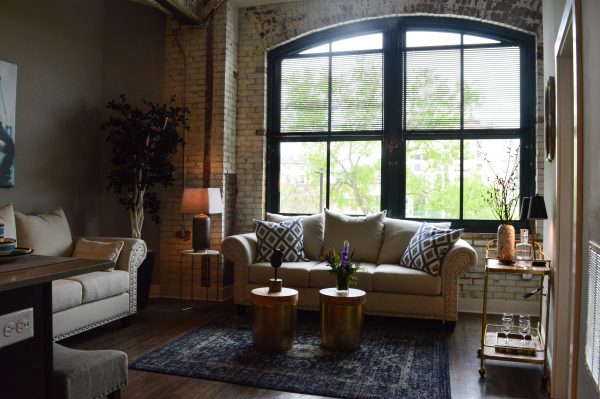
And because more people are moving to downtown to live, Dougherty believes there will be increased office space and retail and more restaurants. Alex Weld , project and outreach manager of Wheeling Heritage, noted that in the last year or so, more people have reached out to Wheeling Heritage. New property owners have recently been buying up places in downtown. “They want to get in now because things are really starting to change,” she said.
“Cultural amenities and cultural assets are crucial to a community because they protect the authenticity of a city. Not a lot of people want to live in Anywhere, U.S.A.,” Dougherty said. “They want to have a sense of place. They want to know that they’re part of a community that’s different from the next. Wheeling has that in abundance. … And how do we ensure that that is protected and repurposed?
“We have these amenities — the symphony, The Capitol Theatre, Oglebay Park … Wheeling feels bigger than 27,000 people. That comes from Wheeling always looking toward growth. When we talk about visitors … that’s where our cultural amenities really matter. Historic tourism, heritage tourism … brings in the most amount of money per visitor. … Experiences like small boutique shops — Centre Market is uniquely Wheeling. There’s nothing there that you can really find anywhere else. That place really benefits our community.”
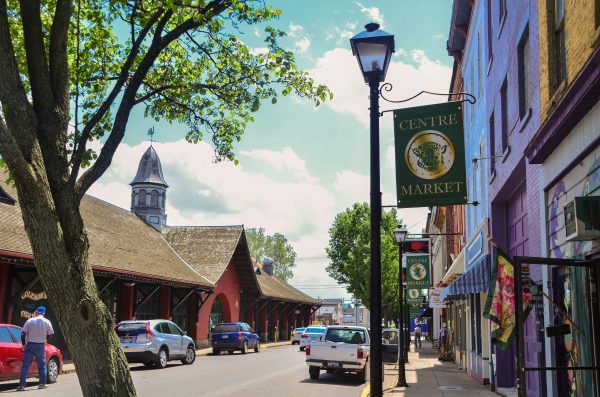
SHARING THE STORY
Dougherty also wants to “tell Wheeling’s story.”
“We’re going to launch some podcasts and some other activities that really help us reach new audiences and tell new stories from new perspectives. That’s telling past and present [stories] and looking toward the future. … We need to engage more people in the community by allowing them to see themselves in the story of Wheeling.”
Dougherty recalled a Show of Hands plea by Ron Scott several years ago. Scott, who now is a Show of Hands committee member and serves as the cultural diversity and community outreach director at the YWCA Wheeling, was making a case for a grant to fund the Ohio Valley Hip Hop Awards. “He probably made the most moving presentation I’ve ever seen, I’ve ever heard. He said, “I work with a lot of kids who talk about that this reinvention of Wheeling, and they don’t know if they’re part of this reinvention.’ And that’s something that has stuck with me for a long time.
“If we’re going to create sustainable community and economic development, then everybody in our community needs to feel a part of that solution and needs to hear their voice in the solution and see themselves in the solution,” he said.
MORE VOICES
“One thing we’ve really been talking about is increasing the opportunity for volunteers,” shared Weld. She plans to have a volunteer meeting with people who are interested in helping to do small, community-led projects to help revitalize downtown. “[They] can come share their thoughts and brainstorm on how we can those done, based on their initiatives. We can provide the resources they need, but we want the community to feel they’re a part of these projects.”
INTO THE NEIGHBORHOODS
Dougherty said that the Main Street Program soon will be expanding from the downtown area into other neighborhoods in town. A historic district will be created in the near future for South Wheeling. They’re looking to expand to North Wheeling and eventually into Warwood, he said.
“We’re going to expand into the neighborhoods because that’s where people are living. We can allow the residents to have access to more resources for the expansion of historic districts. I think that’s really important to create a sense of ownership for the neighborhood and allow them to become really vibrant places. They just need a little more incentives to get there,” Dougherty said. Historic districts are foundational to historic preservation — allowing for tax credits, grants and other resources. Dougherty pointed out that Wheeling has “one of the most competitive historic tax credits in the country.”
There’s “a lot of talk about downtown, it’s the core part of our community, but the neighborhoods … we don’t let those go. We don’t just forget about them,” he pointed out.
“Our full focus area of Wheeling Heritage is all of Wheeling,” Weld said. “We have a specific focus on downtown for Main Street activities, but Wheeling Heritage works throughout all of Wheeling.”
THE FINISH LINE
“We’re going to continue to ensure the historic preservation projects that are in the pipeline of development reach the finish line and become active places again,” Dougherty said.
One project, in particular, is the renovation of the Wheeling-Pittsburgh Steel building into living space. “That’s a project that is critically important to our community,” he pointed out.
“There is a driving market for housing downtown. The best way to revitalize a community is to bring a population into the downtown that supports restaurants and retail and employment. We’ve seen a really big employment increase over the last few years. We have a market-driven solution, which is housing in our historic properties, and I think we’re going to make sure those get to the finish line.
“There are some other historic projects that have been talked about recently — 1107 and 1109 Main Street. We’re going to work with those private developers to make sure they have solutions.”
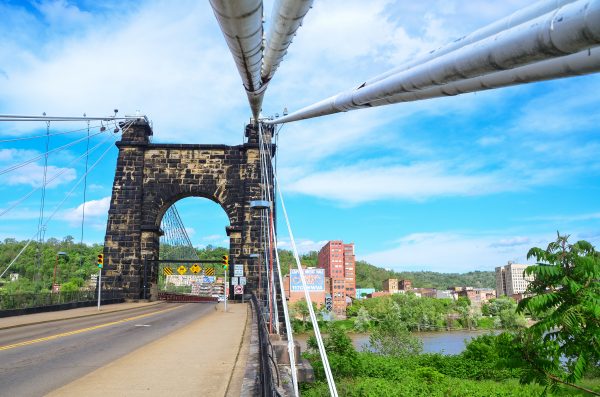 WHEELING HERITAGE — THE FACILITATOR
WHEELING HERITAGE — THE FACILITATOR
Wheeling Heritage is the facilitator that ensures Wheeling continues to be a vital place to live, work, play and visit.
“We don’t do every project; we facilitate them. We really bring the community to the table. Like Show of Hands … we bring the funders (the attendees) and the presenters (the grantees]. We put those people together and show the community that they can make an impact [by] invigorating the community as well as providing capital to community members to really get their ideas off the ground or expand,” Weld said.
“And I think a lot of our programs focus on that,” Weld said, pointing to the shop on the Artisan Center’s second floor. “We are providing that platform for artisans to sell their work. We’re elevating them. We’re doing art shows. We’re bringing their work to the people. All of those types of programs, with historic tax credits, with historic districts, we are giving the resources to the people that need them the most. We don’t do all the work; we facilitate it. And the community is empowered to do it.”
“Communities think there are always organizations like ours,” Dougherty said. “There just isn’t. We’re the only type of organization that does this kind of work in West Virginia.” The fact that Wheeling Heritage provides not only in-depth technical assistance around preservation, but also entrepreneurship development, arts development, and historic interpretation and preservation work, is unique, he said.
HOWDY, PARTNERS
“We are a city that has been able to stabilize our community and grow our community based on preservation. And that preservation has taken a number of partners. It’s taken RED [Regional Economic Development Partnership] that has purchased and redeveloped several buildings. It’s taken CVB [Wheeling-Ohio County Convention and Visitors Bureau ] who took a big chance on The Capitol Theatre. … the City of Wheeling on [the Artisan Center].
“It’s taken a lot of people and a lot of partners to make preservation work. It’s not easy, but if our organization wasn’t here to help guide that, it would very challenging. I think we often are the hub. We’ve grown as a staff, and the type of skills that our staff has right now is unmatched. We have from a historic preservation perspective or historical interpretation perspective … the lineage of both Travis [Henline] and Betsy [Sweeney] is incredible. … They’re able to bring extremely high-quality thinking to our community. Chris’ [Villamagna] depth in the arts community and network is incredible. Alex’ ability to engage with small businesses and entrepreneurs and to create the resources that they need and the programs that they need and to help them get to the point to take action … is again unmatched.
“We are not capable of doing any of this work by ourselves. We are at a point right now where we have a staff that is thinking about the problems with intention and with a bent for results. And I think that’s what allows us to and has allowed us to help shape a new narrative around Wheeling. And I think it’s a narrative that everyone believes in.”
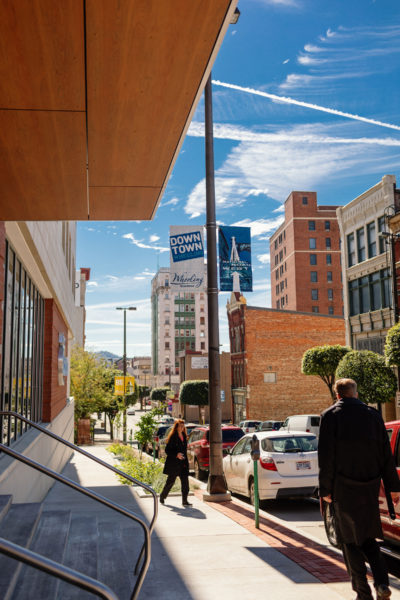 TAKING RISKS
TAKING RISKS
Trusting others and taking risks are key to the success of Wheeling Heritage’s endeavors. And so is showing initiative.
“We haven’t been afraid to try new things. … When we first looked at tax credits, I was told there was ‘no way’ that this was ever going to pass. … We weren’t afraid to spearhead that activity because it mattered to our community. It was the right answer. It opened up a lot of potential … it loosened up funds that could be used here to redevelop our downtown.
“We weren’t afraid to let go of control around Show of Hands. We’ve been OK with letting the community have a voice and be active. I think we’ve done that over and over again.
“We’re going to deliver the best programs that we can. We’re going to do it in a smart and effective way. We’re going to do it in a way that is answering the question, ‘What’s best for our community?’ … And if we can be a leader in our industry and a leader in our community because we’re willing to be the first through the line. … I think that people support our organization because we are willing to be a catalyst for change. We have to take bold steps. We have to be willing to take on a little bit of risk in order to create the type of ecosystem that we all want to see. Wheeling.”
A SHARED VISION
Dougherty has a theory about assets. He believes assets should drive the conversation about Wheeling’s future, not “what’s missing.”
“I think it’s a totally different approach than looking at a community and saying ‘this is missing, and this is missing, and this is missing … let’s fill it in.’ That’s forgetting what the community is and trying to reshape it. What we’re trying to do is help the community that is great get better by looking at the things that are already here.
“The shared vision of Wheeling is a vibrant community and a vibrant downtown that celebrates our rich heritage but also illuminates our great future. That’s what people are looking for,” Dougherty said. “They don’t want to see all of our historic buildings lost. But we also want to see new opportunities come to town. It’s our goal to walk that line. And be a supporter and facilitator of preservation and productivity and opportunities.”
• After nearly 38 years as reporter, bureau chief, lifestyles editor and managing editor at The Times Leader, and design editor at The Intelligencer and Wheeling News-Register, Phyllis Sigal has joined Weelunk as managing editor. She lives in Wheeling with her husband Bruce Wheeler. Along with their two children, son-in-law and two grandchildren, food, wine, travel, theater and music are close to their hearts.

